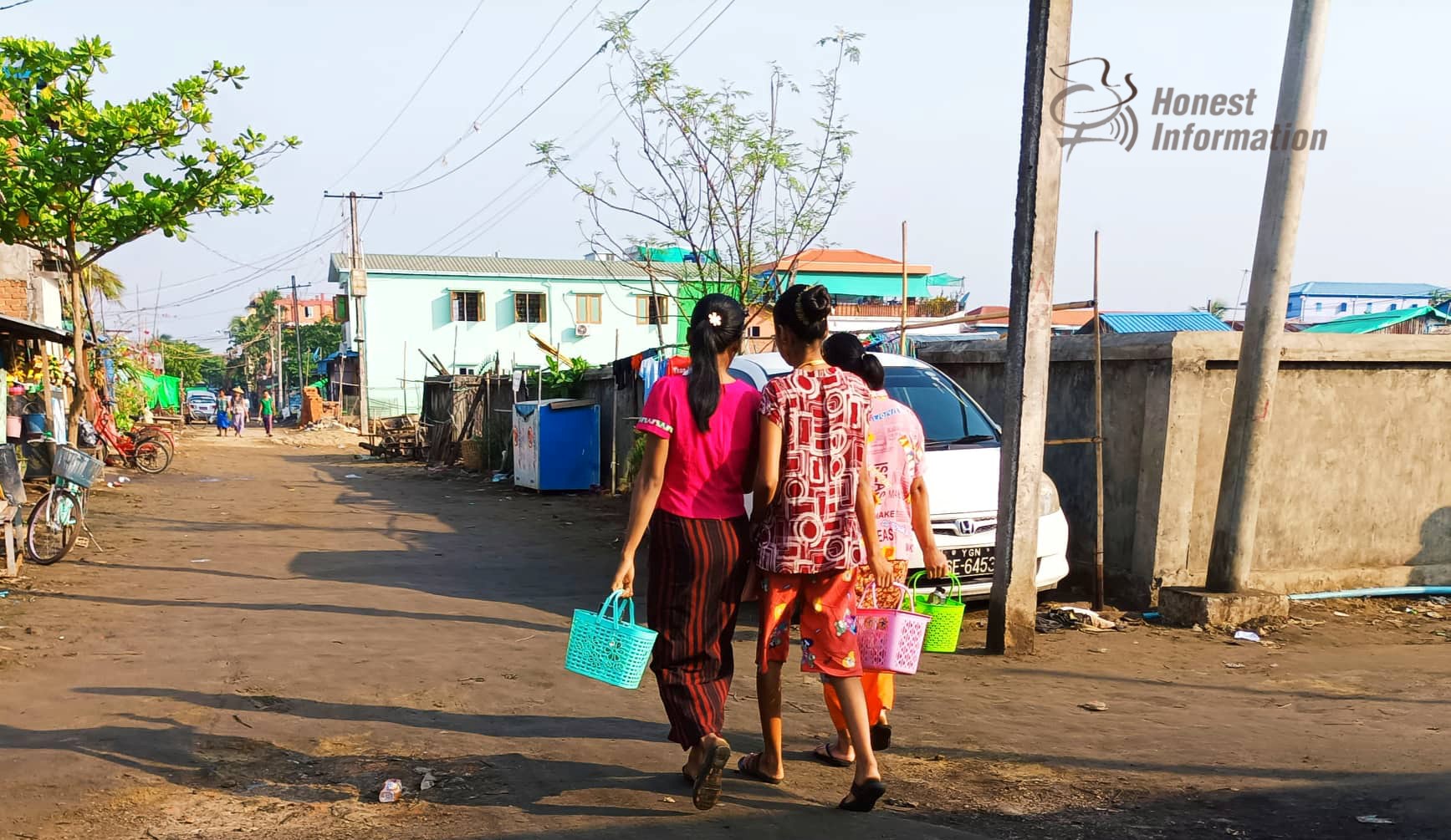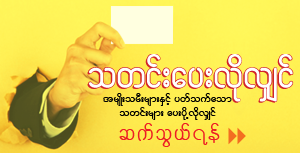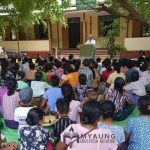Our rights were taken away with the coup
Written by Shin Nyein/ Translated by Ba Kyaw
Employers are openly violating workplace rights and labor laws under the protection of unstable political situations.
In the workplace, women workers are openly sexually harassed.
“They slapped our butts because we didn’t dare to complain. Occasionally, they embraced our shoulders and kissed like a ridiculous”, 24 years old, garment worker Yi Yi Soe said.
She said, most of the girls in the factory are sexually harassed by the factory management team.
Yi Yi Soe worked with 400 workers at Myanmar Tencent Fashion Garment in Shwe Pyi thar, Yangon, which is owned by a Chinese. She has been working for three years in this factory, and her native is Minbyar township in Rakhine.
Following the coup, there have been numerous violations in the workplace where Yi Yi Soe is working.
There are such things as forcing laborers to work overtime without pay, forcing them to do more work for less pay, firing senior workers and replacing them with day laborers, unfair dismissal without compensation, prohibiting the formation of a labor union, no ferry service for night workers, forcing them to work on government holidays, not allowing leave, not paying salary on time, swearing rude words that no one dares to hear in the workplace, sexual harassment of female workers, and so on.
There is no place for workers to express their dissatisfaction or complain when infringing their rights.
If the workers complain about a violation of their rights, the employers threaten them to silence with the following words; If not satisfied, get out! Complaint wherever! We can call the army to arrest you for being involved in politics!’ and so on.
The coup d’état army targeted the workers who resisted the dictatorship, and they disbanded the labor unions. In addition, labor activists were arrested and imprisoned, and declared illegal. These situations left the workers helpless.
At least 54 members of labor unions across Burma have been killed since the coup. Nearly 300 workers were illegally detained by the military council.
Meanwhile, the military forcibly destroys the illegal house of squatters where the workers live and put the industrial zone into a martial law area.
At last, employers are taking advantage of the lawlessness by shamelessly violating workers’ rights.
The director of Solidarity of Trade Unions Myanmar, Daw Myo Myo Aye commented, “Workers’ rights are most commonly violated during this time. There is no cure at this time.”
After the coup, Daw Myo Myo Aye was arrested by the military council under Article 505 (a) and was monitored when she was released.
In addition, military authorities declared 16 labor-related organizations illegal including STUM, on 2021 March 1.
The labor has no place to complain because the labor ministry under the military always shut down their door for fear the strangers and bomb attacks.
Managers, supervisors, and line leaders take protection from these incidents to cover their labor exploitation and sexual harassment of women labor.
Women workers suffer from stress not only in additional work than usual but also because supervisors and line leaders often use obscene language without reason.
“I had to work hard because of my dependent family. I am sure to leave this work if my own. Their obscene language is quite ill-bred. Sometimes I feel so depressed that I want to suicide,” Yi Yi Soe said.
Most workers were forced to work 10 hours a day without overtime pay, and their wages were reduced. Every time they expressed their dissatisfaction, they were forced to resign.
Due to job scarcity, workers accepted all kinds of oppressive rights and worried about losing their jobs.
Glory Fashion in Hlaing Tharyar Industry, which employs 800 workers, also fired the workers for failing to meet the unfair output quota.
Ma Ei Tar, who was fired by Glory Fashion said “After three warnings for failing to fulfill the output quota, they fired me. They raised every day that the standard to set the output quota. We are humans, not robots. We need rest time. But they fired many people.”
Usually, the workers sew between 80 and 90 garments per hour, but now they have to sew between 150 and 180 garments per hour. Glory Fashion forced workers to work without even mealtime.
According to her disclosures, the factory forced most workers to sign for failing the output quota. If the worker had to sign three times, the factory management fired him without severance pay. Due to overtime, no one allows for official leave.
After the military coup, the factory did not fully pay the minimum wage of 4,800 kyats per day for workers.
The factory also terminated 10,000 kyats each day for the worker’s absence without leave. And then, they fired this employee after three times absences.
According to Myanmar Labor Laws, employees who have worked a minimum of 20 days per month for the previous 12 months are entitled to 10 days of paid leave each year, regardless of any disruptions caused by illegal strikes, lockouts, sickness, or accidents. But no labor law was effective at that time.
When there is job scarcity, the worker is oppressed and forced to resign.
Ma Ei Tar explained that factories oppress workers, and when they quit, they hire day laborers. And then they dismiss day laborers for less than three months.
Most employers fire employees during a three-month probationary period for various reasons. Then, about a week later, they will appoint back them as a day laborer.
Factory owners were afraid that probationers have the right to apply for permanent employment when they have a suitable length of service and worried to give the labor right benefit when they become permanent.
According to the workers’ opinion, employers are concerned that if probationers become permanent employees, they will be required to provide them with the legal rights they are entitled.
Senior workers are working as day laborers in other factories, and they lose their rights based on length of service because employers are firing them without reason.
For a month, the management of an Indian-owned SIOEN Myanmar Garment with over 700 workers in the Hlaing Thar Yar Industrial Zone sacked Ma Thazin, who had been working for three years, without explanation.
If an employer legitimately fires an employee, the employee must be given one month’s notice and be compensated.
And the compensation legally prescribed is to pay three months’ salary to a person with three years of service.
“We had to sign a legal contract when we started working. It was no longer legal when fired. At least 50 workers did not get compensation. We lost a lot because they didn’t follow the law. In this period, in their tongue was the law.” Ma Thazin said.
Abuse of labor rights does not end there.
Employers terminated previous contracts with workers after the coup. They also collaborated with a committee organized by their trustworthy workers, and they forced workers to sign a new contract that oppressed them.
The contract stipulates that no leave is allowed and that they will be deducted roughly 20,000 kyats each day for their absence, which includes a minimum wage of 4800 kyats, an attendance bonus, and overtime fees.
And a worker must pay 500 kyats each month for social warfare in addition to her regular social security contribution.
“We do not want to sign this new agreement,” San San Aung said.
She has worked for Lucky Fortune Co. Ltd for five years, a Myanmar-owned garment factory with about 1,000 employees in Shwepyithar Township, Yangon.
She was forced to resign if she did not sign a new contract at the factory.
She explained, “We will starve if we don’t sign. And we must have to sign, how exploitive to us. For a family who is reliant on us.”
The workers paid monthly social security contributions, but they have not received any social security benefits since the military coup. And they have sworn and threatened when they took social security leave over three days.
Moreover, several factories have sacked pregnant workers for fear of missing out on their factory workload and having to provide for maternity leave.
“Nowadays, the military is their supreme. They threatened us with it. When we responded their insulting, they asked whether we wanted the military to come in and pull us out,” San San Aung said.
She asked that they forced us to work half-day on government holidays. And they collect monthly social security contributions. But they did not return the full benefit. What does it mean?
It is not only garment factory workers but also the food and beverage industry and other industries workers who have been violated labor rights since February 1.
Due to the job scarcity, some factory workers have to work only three days a week, and some have only two days a week. Luckily, Yi Yi Soe is a 5-day worker, with ten working hours per day.
She should earn 126,000 kyats per month for her working 21 days, the factory paid only 75,600 kyats and collected 2,880 kyats for social security and 500 kyats for welfare. This makes it difficult for Yi Yi Soe to pay for the hostel Bill.
Even if a 5-day worker had it difficult, a 3-day worker and her family would find it even more challenging to have two meals every day.
These incidents highlight how labor rights have been violated during the recent coup.
On the other hand, each factory has to pay about 100 lakhs kyats a month to the coup army to run the factory, according to the garment owner, who does not want to be named.
No one answers for the helpless workers on how to resolve the violation of their rights when the worker rights activist are fleeing for their security concerns.
According to National Unity Government (NUG), Ministry of Labor Union Minister Nai Tun Pe (b) Nai Wunna, anyone who violates workers’ rights will be severely punished. He stated that on April 17, the state reported to the public program.
According to the ILO announcement on March 25, International Labor Organization (ILO) has decided to establish a Commission of Inquiry in respect of the non-observance of International Labor Standards in Myanmar, following the military coup in February 2021.
ILO announced that A Commission of Inquiry is the ILO’s highest-level investigative procedure and is generally set up when a Member State is accused of committing persistent and serious violations and has repeatedly refused to address them.
But it is unclear whether all of this will work under the dictatorship.
Even if there is no organization to promote the worker’s rights, it should be easier to complain to the Ministry of Labor under the military, Yi Yi Soe expected.
She said, “I want my workers’ rights to be restored to their previous state.”





